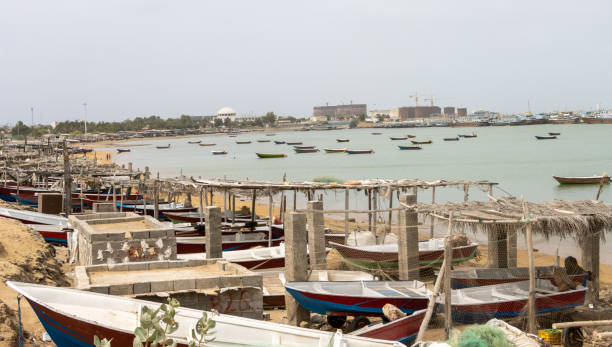
Allah has blessed Balochistan with a 750-kilometer-long coastline. It is home to over 350 species of fish, including high-quality shrimp and lobsters. Commonly known varieties include Dotty, Dangri, Goli, Suwa, Kund, Pomfret, Paghus, Dhothar, Khagga, Dandiya, Ghasur, Abroz, and Hira. The cuttlefish, known locally as "Mahiya," is not consumed in Pakistan but is exported in large quantities to China, Japan, and other regions. The fish that reach the fisheries in the freshest condition are exported, while the rest are what we get to eat. Fish is also exported after being salted and sun-dried or processed. Both small and large boats are used to catch these fish. Balochistan, fishermen, and fishing are inseparable. Fishermen have lived in coastal areas for centuries. Wherever even one family resides, they park their boat on the beach, which becomes their fishing port. There are countless such boat stops along the coast of Balochistan. These places can neither be called fishing harbors nor jetties, fisheries, or ports. There are about 35 such settlements along the Balochistan coast. Notable settlements include Hormara, Pishkan, Sur Bandar, Gabad, Sannat Sar, Kapar, Ganz, Nokh Bar, Chur, Rumbra, Garosant, Makola, Jafari, Hud, Kolmeer Sant, Taak Bandar, etc. Fish from all these settlements are sold at only eight places: Gwadar, Pasni, Jiwani, Pishkan, Sur Bandar, Dam, Gadani, and Kund Malir. There are only three places in all of Balochistan that have fish harbors: Gwadar, Pasni, and Gadani, where fish are purchased at lower rates and the real auctions happen in Karachi. By the time fish reach Karachi, their freshness decreases, resulting in lower prices. Around 8,000 to 10,000 small and large boats are engaged in fishing along the Balochistan coast.
"Sunehra Beach" is a coastal fishing port located on the way to Mubarak Village, situated at the delta of the Hub River. Approximately 400 boats operate here. The land is in Sindh, while the water belongs to Balochistan, and all fishing activities depend on Balochistan's fisheries. The majority of non-professional and amateur fishermen rent boats here and catch fish, which is then sold to fish traders without any tax or record. This amounts to thousands of tons of fish auctioned in Karachi Fisheries. There are no government representatives or facilities here.
Gadani, known for its ship-breaking industry, is a small town located just an hour away from Karachi. It’s also a popular picnic spot visited by thousands of tourists on weekends. The population grows with the arrival of ships. While it was once a booming industry providing raw material for Pakistan’s steel industry and jobs for millions, its significance has diminished, and today, it only makes the news due to ship accidents. The fisheries here are modest, and like the other ports, the fish eventually end up in Karachi Fisheries. A few miles ahead is the fishing village of Alana Goth or Chapra. Fishermen here lack any facilities. They take their catch to Karachi Fisheries, paying tolls along the way.
Between Gadani and Pasni lie villages such as Dam, Kund Malir, Spit, Hingol, Ras Malan, Hormara, Taak Bandar, and Kalatu Bandar. Dam is located 100 kilometers from Karachi and lies on the gulf of Miani Hor. Shrimp and jellyfish are found here. The fish population has diminished due to illegal netting practices, and factories processing fish waste have polluted miles of the region around Windar. Laws governing net sizes are openly violated. Once home to 700 families, Bharo village is now nearly deserted with only about 70 remaining. Fishermen used to catch enough fish in one night to make a living, but today, they struggle to find fish. Erosion is a major problem, with 10 to 20 feet of land lost every year. Flooding during the monsoon season also affects the village.
Kund Malir suffers from a lack of jetties and facilities. If the ice truck doesn’t arrive one day, the entire catch is wasted. Larger boats anchor at a distance, and smaller boats are used to bring the catch ashore, which increases costs. Hingol and Ras Malan face similar problems. Fishermen struggle to survive in dire conditions, working hard to make a living from the sea.
Pasni, located 500 kilometers from Karachi, was a small fishing settlement. In 1932, under the reign of Mir Ahmad Yar, coastal trade started here. Imports of fabric from Japan, sugar from Cuba, and blankets from Italy commenced, while exports of mats and dried fish from Pasni went to Colombo and India. However, the fish harbor declined due to lack of dredging, leaving fishermen in poverty.
From Hormara to Pasni, fishing settlements like Taak Bandar and Kalatu Bandar exist. Moving further, Kalmath comprises a few fishing settlements where residents catch fish and sell them in the local market of Hormara. Gwadar, a historical region, is now on the path to rapid development under the China-Pakistan Economic Corridor (CPEC). The port is being modernized to handle large ships and boost international trade, with hopes of transforming the lives of local fishermen.
Further along the coast, Jiwani and other fishing settlements near the Iranian border rely on fishing as their primary livelihood. Despite these rich coastal areas, fishermen in Balochistan face numerous challenges, from lack of facilities to economic hardships. However, the future of Gwadar under CPEC holds promise for this region and its fishing industry.







.jpg)
0 Comments